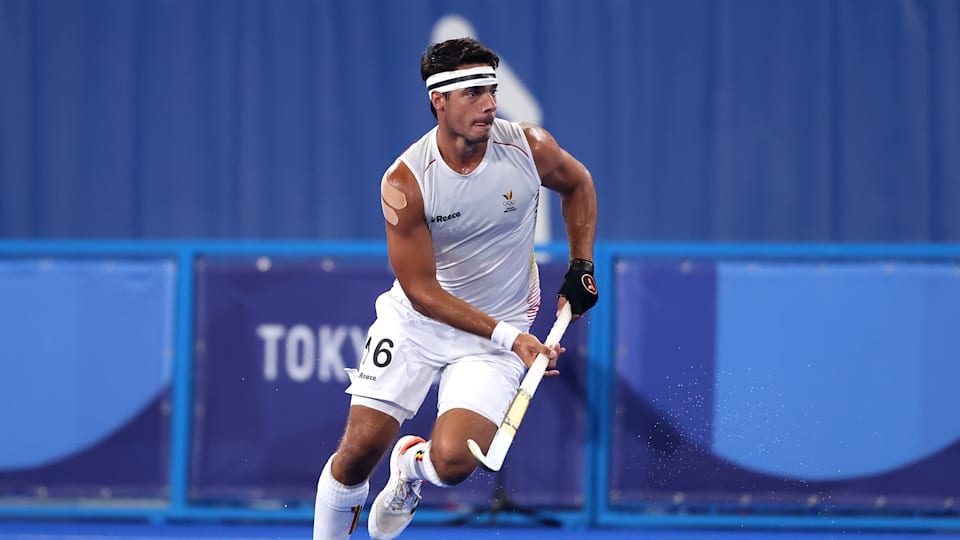Q&A: Hockey hero Hendrickx revels in Tokyo gold after YOG and Rio heartbreak
Belgian hockey star Alexander Hendrickx talks to us about reaching the top of the Olympic podium in Tokyo after being a reserve at Rio 2016 and a bronze medallist at the Youth Olympic Games (YOG) in 2010.

With his unstoppable drag flicks from penalty corners, Alexander Hendrickx helped fire Belgium to the country’s first ever Olympic hockey title at Tokyo 2020, scoring an incredible 14 goals to finish as the tournament’s top scorer.
His goal-scoring heroics were a far cry from his last Games experience, when he watched on longingly as a non-playing reserve at Rio 2016, as Belgium made a historic charge to their first Olympic final.
After watching the team win silver in Rio, Hendrickx vowed that he would be part of the line-up for the next Games in Tokyo – and not only delivered on that promise but delivered Olympic gold too.
Here, he reflects on his Olympic journey, which began with a bronze medal at the YOG in Singapore in 2010.
Olympics.com: What has life been like for your since winning gold in Tokyo?
Alexander Hendrickx: “It was all a bit crazy; a lot of celebrations and I think everybody from our team was living on a cloud. But after a break, we have started with the competition again, so you cannot keep on celebrating. Now, we're back with the gloves on, working towards other targets and fully focused on hockey again.”
What does it mean to you to be an Olympic champion?
“It's like a dream. It was already a dream to participate in the Olympics, but then to achieve the highest honour – it's indescribable, a crazy feeling. You don’t really know how to talk about it; I think that will come later. And you forget it quite easily, because you're still the same person. But then every time someone comes to you and asks for a picture, or talks about it, you think back to that moment, and then it's really amazing.”
How special was it to win gold after being a reserve at Rio 2016?
“Being a reserve in Rio 2016 was mentally one of the toughest moments of my career. You're still close with the team and you live every moment with them, but you cannot help them on the pitch. It's a hard role to play. After that, I told myself, ‘I don’t want to be a reserve anymore.’ I started working on things that I thought could help me to improve, including my penalty corner. I worked harder than ever before because it was a feeling that I never wanted to have again. I think it triggered something in me to fully go for it. And now, everything has worked out. I’m really happy with the progress that I’ve made.”
Your Olympic journey started at the YOG in Singapore in 2010 – what are your memories of that event?
“I remember it was really fun. It was the first time that we had been in an event with all the sports together and we went to watch some volleyball and other things during our tournament. And it was also nice to play against countries you never play against, like Singapore, Chile and Ghana. It was a great time with that team and eventually we came third. We obviously wanted to make the final, but we gave it away a little bit. But still, it was an amazing experience.”
Were you able to learn a lot from that experience?
“Yes, it taught me about being with other sports but still being able to focus on your own competition. That was important, because there’s so much happening around you. And at that moment, you really want to go and watch everything and do everything that you can, but you still must focus on your own competition. That was a good lesson I took from them.”
What are your earliest memories of the Olympic Games?
“When I was young, I didn't watch a lot of sports. But I remember Beijing [in 2008] being the first time Belgium was back at the Olympics [in hockey, since 1976] and seeing some of those games. One of the coaches from my club was also working with the national team and after the Olympics he came back with one of the player’s jerseys. He gave it to me and said, ‘If you do your best, you will be wearing one of these yourself one day.’ That’s a bright and vivid memory for me.”
What would be your advice to young players hoping to follow in your footsteps?
“I have a saying that I use: fall seven times, stand up eight. It means that whenever you get knocked over, you should stand up again and try harder. With all that I went through, and being a reserve in Rio, I think it made me the person I am today, and it made me stronger mentally as well. Everything happens for a reason, so this was the path that was chosen for me and luckily now I’m where I want to be. So, my advice is to never give up and always work hard.”
